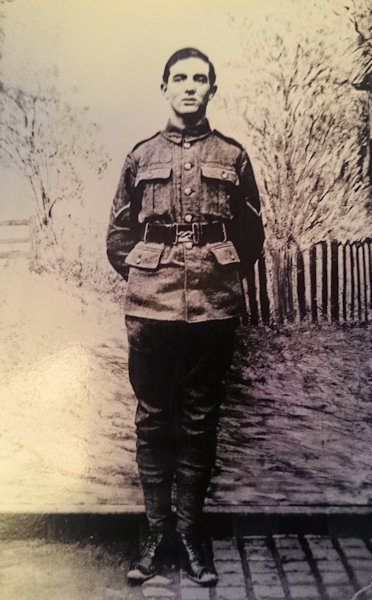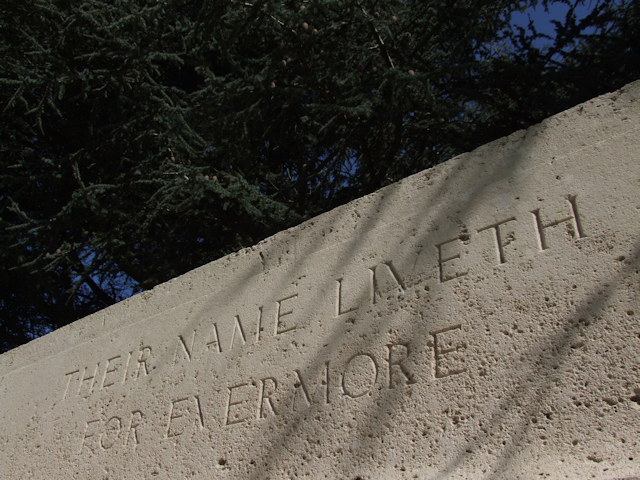Wartime Service
When war was declared in August 1914, George and the men of the 1st Herts were coincidentally away at their one annual Territorial summer camp at Ashridge Park in Berkhamsted. Immediately upon receiving the news, the camp was struck and each company returned home with orders to collect their personal belongings and meet at Hertford the very next day to begin full-time training.
On 6th August 1914 George and some 25 other man of 'E' Company assembled at Letchworth train station where they posed for what was to become an iconic photograph of the local boys leaving for war. Aged just sixteen, George was well underage for overseas service, but, undeterred, he left to begin his training. Over the next three months, George and his comrades underwent strenuous physical training and drill near Bury St Edmunds and Rougham in Suffolk.
Late in the evening on 5th November 1914 George and his comrades boarded the coal steamer, the SS City of Chester, at Southampton and crossed the Channel, arriving at Le Havre in France early the following morning, heading for war.
From his arrival in France in November 1914, George had an incredible wartime experience. He fought with the ‘Herts Guards’ at the 1st Battle of Ypres and at the Battles of Neuve Chapelle, Festubert and Loos in 1915, being slightly wounded in action at that time.
Clearly a capable soldier, George was promoted to Lance Corporal in late 1915 and then to Corporal in 1916. He fought on Somme in 1916 where the Hertfordshire Regiment found considerable success, being wounded for the second time.
Following his second wound, George was transferred to the Bedfordshire Regiment and saw service on the Italian front in 1917 before returning to France once again in 1918 where. On 3rd September 1918 George distinguished himself in action, earning the coveted Distinguished Conduct Medal. His citation reads:
“For distinguished gallantry and devotion to duty in operations patrolling the enemy’s front line and bringing back valuable information. During the attack, he led a patrol party and pushed on to the enemy’s main line, reporting their position to his Platoon Commander. The success of the operation was due in great part to his courage and skill. He captured a machine gun and made the enemy personnel carry it back”.
George was wounded for the third time several weeks later and whilst recovering in hospital in Chelsea met a young nurse from Birmingham named Cissy Goodwin. The two fell in love and were soon after engaged to be married. Although, sadly, George’s war was not yet at an end.
After recovering from his third wound and being posted to the 3rd Battalion Bedfordshire Regiment, George, who had known only war as an adult, volunteered for a service in the little known North Russian campaign, supporting white Russians in their fight against the Bolshevik Red Army.
Part of the small British contingent, George, a decorated veteran of four years fighting on the Western Front, who was still only twenty-years-old, landed at the Russian port of Archangel just days after the Armistice effectively ended WW1. In the North Russian Campaign, the Armistice meant little, and George, now promoted to the impressive rank of Company Sergeant Major, along with another Western Front veteran, Captain Card, began training operations with their company of Russian soldiers. Whilst in Murmansk, George regularly wrote home to his family and Fiancée Cissy.
“My Dearest Mother,
I now have the pleasure of letting you have a few more lines just to let you know I am still getting along alright out here and sincerely hope that everyone is keeping quite well and fit at home. Say we have not been lucky enough to get any letters from England yet but of course we all hope to get a mail in the near future. As at present we are all about fed up with waiting for any news, but of course we won’t mind so much after we get our first letter so we will then know at least you got our first one to say that we had arrived here safe. Well Mum Christmas is beginning to draw very near so I hope all of you at home will have a very enjoyable time and you need not worry about me because I think we shall manage to have a good time enough ourselves and up to now nothing whatever stands in our way as we can obtain nearly anything. Saturday evening I went to the YMCA in town where a party of Russian Ladies gave us a very enjoyable concert so you see we don’t do too bad taking things all around. Well Mum I suppose you hear from Ciss now and then, at least I hope so because I think having a letter from each other helps to pass things off a bit and I expect you all miss having the regular letters from me, but of course you know it is not my fault and at present I know you all have a letter in the mail here waiting to come to England so with this one you will have two arrive at the same time cos I think a boat leaves here sometime this week. Well Mum our cold weather is still holding out but it is dry thank goodness and now I see the people here are just starting to lay the tram lines etc. across the ice so you can just guess what sort of frosts we have been getting. Well Mum I think this is all for this time so I think I will conclude now, trusting this will find you all intending to have a good time this Christmas.
I remain, your loving son
George xxxxxxxx”
George continued writing to his lived ones into February 1919, commenting on the weather and his letters frequently express his desire to finally come home and start a family, writing “Just wait until I come home and I will have the time of my life for a few weeks”.
He also wrote his Fiancee, making plans for the purchase of their first home.
On 12th March 1919 Mrs Drury received a cablegram from Leonova, Russia stating “don’t worry, quite well, George xxxxx”. It was the last she ever heard from her son.
Several months later, George’s fate finally became clear when his commanding Officer wrote to Mr & Mrs Drury at Letchworth reporting that George’s time serving in Russia had expired and he was due to return home but due to the port being iced over he agreed to do go on one last mission. According to a fellow Sergent in the same attack they “shook hands before and joked about how strange it was to be going back in action again”.
Whilst advancing towards the village of Yemetskoe, George’s Officer Captain Card, was ambushed and wounded by machine gun fire and left in the open. In attempt to save him, George had made his way to his officer through deep snow and was himself hit. A patrol was sent out that night and found both bodies side by side. Sergeant Tovey reported that “When the patrol returned to the spot the next morning the bodies had been removed by the enemy.”
George’s original letters home to his family throughout his time in Russia and the letters informing the Drury family of the circumstances around their son’s death are on display here today.



